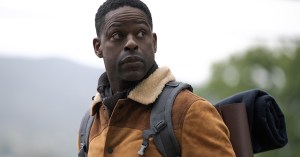10 Memorable Oscar Speeches
There have been a number of memorable speeches over the course of the 90-year history of the Academy Awards, and last night’s ceremony featured a few of its own. With that in mind, we’ve compiled 10 of our favorite speeches — whether powerful and poignant or silly and endearing — by Oscar winners over the years.
Marlon Brando, 1973
Who took the stage when Marlon Brando won the Best Actor statue for The Godfather in 1973? Sacheen Littlefeather, an Apache woman whom Brando had sent in protest of Native American depiction in Hollywood films, in addition to the ongoing Wounded Knee siege that would ultimately lead to four deaths. Littlefeather was initially met with boos and jeers from the crowd, but ultimately earned overwhelming applause. Brando had written a 15-page speech detailing his beliefs but, the Academy refused to allow Littlefeather to read it, and immediately implemented new rules prohibiting proxy acceptances.
Sally Field, 1985
We’ve all heard this one: Sally Field, Best Actress winner for Places in the Heart. The effusive Field accepted the Oscar by blurting: “You like me, you really like me!” But just like Star Wars‘ “Luke, I am your father,” or Casablanca‘s “Play it again, Sam,” the line is a misquote. What Field really said: “I can’t deny the fact that you like me, right now, you like me!” Her line is also a sly reference to her Norma Rae character (the Academy previously awarded her for the role), but what everyone saw was Field’s wildly earnest attitude, ripened for parody.
Jack Palance, 1991
It took Jack Palance only two minutes — while accepting the Best Supporting Actor award for City Slickers — to ridicule Billy Crystal, bring the house down roaring with laughter (several times!), toss off a few one-armed pushups, and recount the story of how it took 42 years for him to finally take home the big prize. It was the glorious moment when old-school cool and rugged Hollywood masculinity last took over the Oscar stage.
Joe Pesci, 1991
And the shortest entry in this list goes to the shortest acceptance speech in Oscar history. Joe Pesci, upon accepting the Best Supporting Actor award for Goodfellas, simply remarked: “It’s my privilege. Thank you.” Then he beat someone to death backstage.
Tom Hanks, 1994
Once known strictly for comedy, Tom Hanks turned that business right around with his Best Actor win for Philadelphia, portraying a closeted lawyer diagnosed with AIDS. From Hanks’ acceptance speech: “Mr. Rawley Farnsworth, who was my high school drama teacher, who taught me to act well the part, there all the glory lies. And one of my classmates under Mr. Farnsworth, Mr. John Gilkerson. I mention their names because they are two of the finest gay Americans, two wonderful men that I had the good fortune to be associated with, to fall under their inspiration at such a young age.” The problem? Farnsworth had yet to come out as gay. The blunder later inspired the Kevin Kline joint, In & Out.
Cuba Gooding Jr., 1997
An ordinary speech demands you to be alert, pay attention, and maybe feel a little happy for the guy giving it. Cuba Gooding Jr.’s acceptance for Best Supporting Actor in Jerry Maguire was not ordinary. His words were blisteringly joyful; with each shoutout he gave a taste of what it feels like to have your biggest dreams, your earliest childhood fantasies, validated and come to life. The walk-off music only made it sound more epic.
Roberto Benigni, 1998
Roberto Benigni won Best Foreign Film for his Holocaust tragicomedy, Life is Beautiful. The giddy, ecstatic Italian famously hopped on some seats and greeted the crowd, whom he told he wanted to kiss while accepting the statue. During his speech for his Best Actor win, he remarked, “There must be some terrible mistake! I used up all my English!” When presenting the Best Actress nominee the following year, Benigni was accompanied by Billy Crystal holding a giant net for restraint.
Lupita Nyong’o, 2014
Lupita Nyong’o won the Best Supporting Actress Oscar for her role as Patsey in 12 Years a Slave. She began her poignant speech by acknowledging the suffering of the woman she’d portrayed, and after giving her tearful thanks to family and friends, the Mexican-Kenyan actress beamed, “When I look down at this golden statue, may it remind me and every little child that no matter where you’re from, your dreams are valid.” Not a dry eye in the room.
Patricia Arquette, 2015
Patricia Arquette won her Best Supporting Actress Oscar for her role in Boyhood, the movie that took an epic 12 years to make. She capped her acceptance speech by declaring, “It’s our time to have wage equality once and for all and equal rights for women in the United States of America.” The statement received a whooping response from the likes of Meryl Streep and sparked a fight towards equal pay for women in Hollywood.
Frances McDormand, 2018
Three Billboards Outside Ebbing, Missouri star Frances McDormand accepted her second Best Actress award (her first was in 1997 for the Coen brothers’ Fargo) by first declaring, “I’m hyperventilating a little bit. If I fall over, pick me up, because I’ve got some things to say.” And boy, did she ever. After her thank yous, McDormand set her trophy on the floor and invited every female nominated for any award to stand, then enthusiastically encouraged everyone else to take meetings with them, because they’ve all got stories to tell. It was the perfect way to cap off a year of female empowerment in Hollywood, particularly in light of the ongoing #MeToo and Time’s Up movements, and her final words — “inclusion rider” — introduced a lot of people on social media to a concept we may be seeing a lot more of in the industry very soon.





